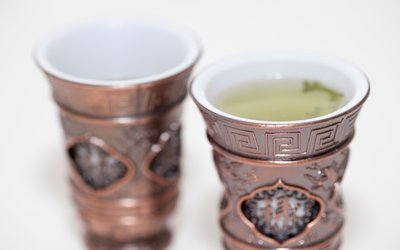Which Herbal Tea Should You Choose? Five Favourites
You know herbal tea is good for your health, but which one should you choose? According to complementary wellness expert Aparna Pradhan, PhD, ‘There is an array of appetising flavours of herbal teas available. Some teas, specially designed for therapeutic purposes, have a blend of different herbs. Popular herbal teas are chamomile, peppermint, ginger, lemon grass, cinnamon, liquorice, cardamom, basil, ginseng and chicory.’ Let’s take a look at popular herbal teas and how they can benefit your wellbeing.
1. Chamomile: ‘Chamomile tea is one of the most sought after herbal teas for its natural sedative effect,’ Pradhan notes. ‘It soothes the nerves and helps relieve stress and anxiety. Herbal experts are of the opinion that it can cure insomnia and aid in sleeping well. Chamomile tea is a perfect remedy for migraine. It’s an effective way to get rid of headaches and relieve cramps. Gargling with the herbal infusion can relieve mouth and gum pain. To prepare this tea pour hot water over two teaspoons of dried chamomile flowers per cup and steep for about five minutes. It has a sweet, pleasant and delicate taste. Cooled tea bags can be used for relieving skin irritation and inflammation. Add few cups of chamomile tea to bath water for a refreshed and relaxed feeling. Avoid this tea if you are allergic to pollen.’
2. Ginger: ‘A piping hot cup of ginger tea daily is what one needs to keep the body in perfect health,’ Pradhan asserts. ‘Research highlights the herb’s potential in fighting cancer. Ginger tea, rich in phytonutrients and antioxidants, has anti-cancer, anti-inflammatory and immune stimulating properties. Ginger tea has been valued for treating stomach ailments, nausea, sore throat, liver problems, asthma, rheumatism and travel sickness. It is an age old remedy for curing colds, blocked sinuses and sore throat. Simply add a tablespoon of honey and lemon juice each to the hot decoction. Honey will soothe your irritated throat while the lemon and ginger will clear the blocked sinus. It will give you the desired warmth besides relieving you of cold and throat problems.’
3. Peppermint: Pradhan details, ‘Known for its wonderful aroma and cooling effect, peppermint has been used for centuries to ease stomach pain and treat digestive problems like constipation, indigestion and irritable bowel syndrome. Menthol—an essential oil in peppermint helps in easing out nausea, headaches, stomach cramps and menstrual cramps. Sipping hot tea in the morning reduces morning sickness. It is good for maintaining oral health. Those suffering from motion sickness can benefit by drinking peppermint tea. Carry it with you for relief during the journey. It can be added to bathing water for relaxation.’
4. Lemongrass: ‘Lemongrass is one of the most widely available low cost herbs,’ says Pradhan. ‘The tea prepared by infusion of its leaves is loaded with goodness of cancer fighting compounds.. The infusion detoxifies the body and improves skin health. This tea increases the frequency of urination and is good in treating retention of water. The tea has a calming effect on the body’s muscle and nerves. Sipping the infusion everyday can help people suffering from anxiety and depression. The wonderful aroma alone is enough to uplifts your spirits. A cup of this tisane before bedtime can ensure sound sleep. If you’re trying to lose weight, you could benefit from this but remember not to exceed four cups a day.’
5. Cinnamon: ‘A warm fragrant cup of cinnamon tea can give some relief to those suffering from arthritis,’ Pradhan comments. ‘This tea can benefit diabetics by improving glucose metabolism in them. It can also help to lower cholesterol and triglyceride levels. Cinnamon gives a boost to metabolism and strengthens the immune system. It has a warming effect on the body. This tea is good for the digestive system and gives relief from bloating and flatulence. Cinnamon tea is prepared by decoction. Add honey to sweeten the tea.’


Comments are closed.